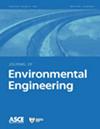Microplastics: The Occurrence in Stormwater Runoff and the Effectiveness of Bioretention Systems for Removal
IF 1.6
4区 环境科学与生态学
Q3 ENGINEERING, CIVIL
引用次数: 0
Abstract
Stormwater is considered a pathway of microplastics to surface water systems, but the magnitude of microplastic pollution in stormwater and the efficacy of existing stormwater treatment methods are unknown. One potential solution for minimizing microplastics in surface waters is leveraging green infrastructure, such as green roofs, bioswales, and bioretention cells, which can be optimized for the removal of conventional and emerging contaminants. The goals of this study were to (1) establish baseline types and quantities of anthropogenic microparticles, including microplastics, found in stormwater, and (2) evaluate bioretention as a possible solution for reducing microplastics in stormwater. To understand baseline conditions, samples were taken from five different catch basins in north Portland, Oregon, during four storm events and analyzed to quantify and characterize microparticles between 106 μm and 5 mm. A baseline concentration of 4.5±2.2 (range 1.1–9.7) particles/L was found, with no observed differences in concentrations between sampling locations or storm events. Most identified microparticles were fibers (66%), and approximately 47% of the particles were cotton, followed by polyester/blend (33%) and nylon (9%). Microparticle concentrations were correlated with the concentration of total suspended solids and the number of pieces of litter collected during a litter survey. To determine the efficiency of bioretention systems for microplastic removal, laboratory bioretention columns were constructed and filled with three different geomedia (a City of Portland, Oregon, standard mix, a proprietary mix, and layered sand and compost). A total of nine columns (three replicates of each geomedia) were tested with stormwater collected from a catch basin in Portland that was spiked with synthetic microplastics (106–5,000 μm). A removal efficiency of 99.8% was observed across all bioretention columns, regardless of the media type. Results indicate green stormwater infrastructure, such as bioretention, may be an effective tool for reducing observed microplastic transport from urban runoff to receiving water bodies.微塑料:在雨水径流中的出现和生物滞留系统去除的有效性
雨水被认为是微塑料进入地表水系统的途径,但雨水中微塑料污染的程度和现有雨水处理方法的有效性尚不清楚。减少地表水中微塑料的一个潜在解决方案是利用绿色基础设施,如绿色屋顶、生物威尔士和生物保留细胞,这些设施可以优化以去除传统和新出现的污染物。本研究的目的是:(1)确定在雨水中发现的人为微颗粒(包括微塑料)的基线类型和数量,以及(2)评估生物滞留作为减少雨水中微塑料的可能解决方案。为了了解基线条件,在俄勒冈州波特兰北部的五个不同的捕获盆地中采集了四次风暴事件期间的样本,并对106 μm至5 mm之间的微颗粒进行了量化和表征。基线浓度为4.5±2.2(范围1.1-9.7)颗粒/L,在采样地点或风暴事件之间没有观察到浓度差异。大多数确定的微粒是纤维(66%),大约47%的微粒是棉花,其次是聚酯/混纺(33%)和尼龙(9%)。微粒浓度与总悬浮物浓度和凋落物调查中收集的凋落物件数相关。为了确定生物滞留系统去除微塑料的效率,构建了实验室生物滞留柱,并填充了三种不同的几何形状(俄勒冈州波特兰市,标准混合物,专有混合物,分层砂和堆肥)。共有9根柱子(每种几何形状的3个副本)用波特兰一个集水盆收集的雨水进行了测试,这些雨水中加入了合成微塑料(106 - 5000 μm)。无论介质类型如何,所有生物保留柱的去除率均为99.8%。结果表明,绿色雨水基础设施,如生物滞留,可能是减少观测到的微塑料从城市径流到接收水体的运输的有效工具。
本文章由计算机程序翻译,如有差异,请以英文原文为准。
求助全文
约1分钟内获得全文
求助全文
来源期刊

Journal of Environmental Engineering
环境科学-工程:环境
CiteScore
4.40
自引率
0.00%
发文量
127
审稿时长
6.0 months
期刊介绍:
The Journal of Environmental Engineering presents broad interdisciplinary information on the practice and status of research in environmental engineering science, systems engineering, and sanitation. Papers focus on design, development of engineering methods, management, governmental policies, and societal impacts of wastewater collection and treatment; the fate and transport of contaminants on watersheds, in surface waters, in groundwater, in soil, and in the atmosphere; environmental biology, microbiology, chemistry, fluid mechanics, and physical processes that control natural concentrations and dispersion of wastes in air, water, and soil; nonpoint-source pollution on watersheds, in streams, in groundwater, in lakes, and in estuaries and coastal areas; treatment, management, and control of hazardous wastes; control and monitoring of air pollution and acid deposition; airshed management; and design and management of solid waste facilities. A balanced contribution from consultants, practicing engineers, and researchers is sought on engineering solutions, and professional obligations and responsibilities.
 求助内容:
求助内容: 应助结果提醒方式:
应助结果提醒方式:


